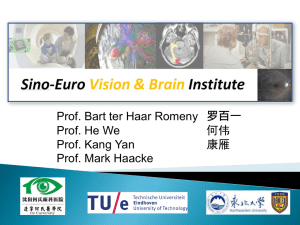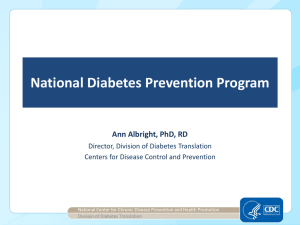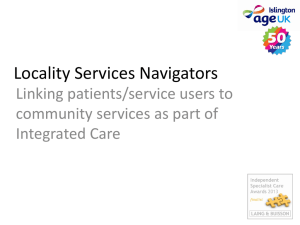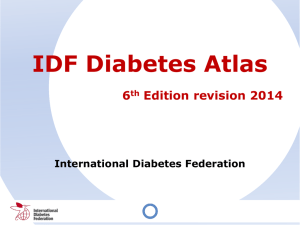Professor Akhtar Hussain - Diabetes Prevention Intervention Study
advertisement
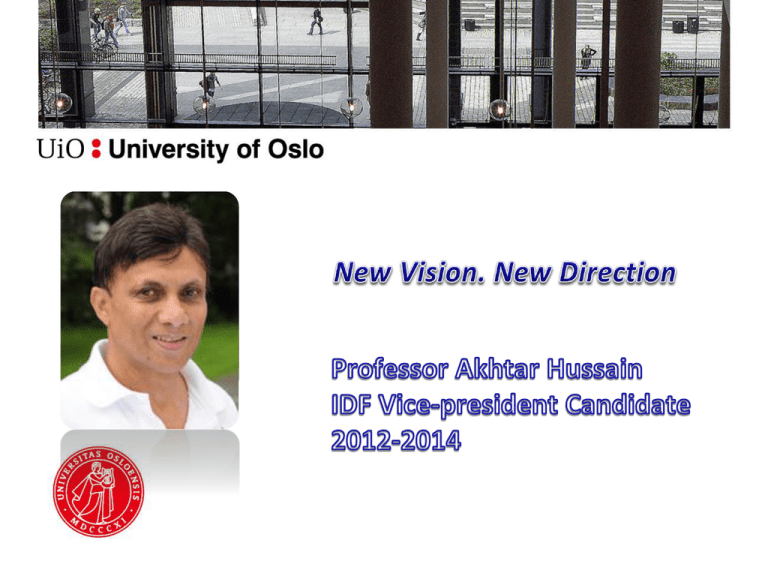
Background Akhtar Hussain Professor : Chronic diseases- Diabetes, Faculty of Medicine Nationality: Norwegian Place of Birth: Bangladesh (1955) Email: akhtar.hussain@medisin.uio.no Phone: +47-22850641 +47-22850643 Fax: +47-22850672 Visiting address: Kirkeveien 166 Fredrik Holsts hus 0450 Oslo Postal address: Avdeling for samfunnsmedisin Postboks 1130, Blindern 0318 OSLO http://www.med.uio.no/helsam/english/people/aca/akhtarh/index.html 3 Academic background • Graduated in Medicine from the University of Dhaka, Bangladesh, Post graduation from Norway and PhD’s both from the Boston-USA and BergenNorway. • He has also obtained advanced degrees in Public Health and Education Psychology in Norway from the University of Oslo and Tromsø. 4 Key Qualifications • Education from Bangladesh, Norway and USA. • Work experience from Norway, UK, Bangladesh, India, Pakistan, Nepal, China, Sudan, Tanzania and Zimbabwe. • Involve in community based intervention programme in Bangladesh, Pakistan, Norway and China to prevent diabetes. • Have been working with the challenges to identify differential risk factors in different population with the immigrants in Europe as a point of departure. • Nutritional Blindness Prevention Programme in Bangladesh since 1984. • Urban migration and Public Health problems in Bangladesh since 1991. • Prevention of “Onchocerciasis” (River blindness) and rehabilitation for the blind in Sudan since 1984. 5 Positions held • Professor: Chronic Diseases- Diabetes, Faculty of Medicine, UIO • Co-editor: Journal of Diabetology : Official Journal of “Diabetes Asian Study Group” (DASG). • Editorial Board Member: World Journal of Diabetes (WJD) • Editorial Board Member: Open Diabetes Journal • Executive Member: Diabetes Asian Study Group (DASG) Steering Committee • Executive Member of the IDF – Scientific Committee (BRIDGES) • Executive Member: Norwegian Forum for Global Health • Life Member: International Diabetes Federation (IDF) • Life Member: Bangladesh Diabetes Association • Member: Medical Advisory Committee, Norwegian Diabetes Association 6 Academic responsibilities Courses taught • Master in International Community Health • Responsible for International Diabetes and Metabolic Syndrome Research at the Master/Ph.D. program in International Community Health, University of Oslo 7 Academic responsibilities • Organise Summer School Program on NCD • Organise International seminars and workshops on NCD in Norway and abroad www. summerschool.uio.no 8 Publications Have published more than 100 in peer reviewed International Journals Three illustrative key relevant publications 1. Hussain A, Claussen B, Ramachandran A, Williams R. Prevention of type 2 diabetes: A review.: Diabetes Research and Clinical Practice, 2006.; 76 (3): 317326. – (cited as top 10) 2. Hussain A, M.Z.I . Hydrie, B . Claussen, S. Asghar. Type 2 Diabetes and obesity: A review. Journal of Diabetology, June 2010; 2:1. http://www.journal of diabetology.org/e-ISSN:2078-7685 3. Hussain A. Type 2 diabetes in rural urban population Diabetic Medicine 2006; 23:449.452 9 Academic interests • My group’s work includes differential risk factors in different population for diabetes type 2 including mental health, “lean diabetes” and diagnosis of diabetes. • Strategies for the prevention of diabetes (diet-exercise, ß-cell function (ex.sulfonylureas) sensitizer (ex:metformin) and in combination in different population is therefore his paramount interest. Also interest in genetic susceptibility for type 2 diabetes, obesity, pancreatic ß-cell function (genetics) and insulin-resistance (glucose toxicity, obesity). • Foetal programming for chronic diseases (Diabetes) is of specific interest. Diabetes among Immigrants and socially disadvantaged in Europe and USA is alos of interest. 10 Research Group- International Community Health, UIO Marilyn Lauglo, Akhtar Hussain, Johanne Sundby, Line Løw, Gunnar Bjune, Ragnhild Beyrer The main research areas• Infectious disease including vaccinology • Sexual reproductive health • Nutritional transition and non-communicable diseases 11 Global Research Partners • • • • • • • • • • Prof. Jean Claude Mbanya (Cameroon) Prof. Graham Hitman (London) Prof. Paul McKeigue (London) Prof. Jakko Tuomilehto (Finland) Prof. Ambady Ramachandran (India) Prof. V. Mohn (India) Prof. Kåre Birkeland (Norway) Prof. Leif Groop (Sweeden) Prof. Jak Jervell (Norway) Prof. Samad Shera (Pakistan) • • • • • • • • • • Prof. Abdul Basit (Pakistan) Prof. Massi-Benedetti (Italy) Prof. A. K. Azad Khan (Bangladesh) Prof. Liaquat Ali (Bangladesh) Prof. Renato Lauro (Italy) Prof. Pierre Maechler (Belgium) Prof. Eckel Jurgen (Germany- ESAD) Prof. L.Hui (CDC, Jiangsu, China) Prof. M.Madhur (Nepal) Prof. M. Eltom (Sudan) 12 Global Research Project - IMMIDIAB Vice-coordinator for an international consortium for Immigrant Diabetes (IMMIDIAB) financed by the EU FP 6. • We develop a network for the diabetes among immigrants in Europe for their specific risk factors compared to the population of origin (where they migrated from) and with the native population (where they migrated to). • This model was eventually used to identify the risk of genetic predisposition and the influence of environmental factors that may contribute to the development of diabetes. 13 Global Research Project - IMMIDIAB 2 Univ in England SME London, Olso ESAD Germany Sweeden Malmo Univ Bangladesh Univ of Rome IASAM IMMIDIAB Financed by EU-FP6 India Brussels Univ Pakistan 14 Global Research Project - GIFTS Vice-Coordinator “Genomic and lifestyle predictors of foetal outcome relevant to diabetes and obesity and their relevance to prevention strategies in South Asian peoples” – GIFTS funded by EU-FP7. • • • The programme includes 10 different countries both in Asia and Europe. This proposal seeks to understand the convergence of genetic and environmental factors, their transmission through parent-child units, and understand the complex array of molecular, behavioural and societal causes of later disease risk. Studies will focus in detail on three critical periods: pre-/peri-conception, gestation and postnatal (including lactation) to understand the windows of opportunity and specific targets for prevention of obesity, metabolic syndrome and diabetes on a population-wide scale. Furthermore, by putting these key early life influences into context of an increasingly divergent postnatal life in home and emigrant populations, this collaborative programme will strike at the heart of adult metabolic disease susceptibility and tailored prevention strategies. 15 Project Consortium 16 Ongoing programme on T2D • Intervention studies: Prevention of T2D in high-risk Individuals (Bangladesh and Pakistan) NFR • Incidence studies of MS and T2D (Nanjing China) NFR 17 Ongoing programme on Manpower development • Master Programme in Dhaka as a regional centre for Public Health Research with a prime focus on Diabetes prevention. (NOMA program) 18 Ongoing programme on Manpower development • • • • • • More than 50 students from Asia, Africa and the Europe completed M.Phil./PhD’s. under my direct supervision at the University of Oslo. In addition to my responsibility at the University of Oslo I am also engaged as a visiting professor and coordinator in one of the worlds first M.Phil. programme in Public Health, focused on NCD and diabetes. The programme is a joint venture between the University of Oslo and the University of Dhaka (Diabetic Association of Bangladesh) financed by the NOMA (NORAD’s Master Programme). I am one of the pioneers in pursuing the Norwegian Govt. Policy to develop educational programme in the south. The main aim is to develop capacity with the view to strengthen the regional infrastructure for Public Health education, research, care and management suitable to tackle the challenges in developing countries, with special focus on contemporary non communicable diseases like Diabetes, Cardio-Vascular Disease and Mental Health. The proposal is built upon a multi-level and multi-disciplinary approach involving three levels: master program, research, and continuing education. The programme is developed as a Regional Master Programme in Bangladesh including Pakistan, India, Nepal and Bhutan. China is also taking part in this programme as an additional partner. From the partner Institutions, students and teachers are exchanged including workshops. This is a two years programme and each year 30 students are admitted. 19 20 My Motivation • • • • • • To promote a network of professionals between north and south and bridge the gap between health professionals and diabetes organizations in both hemisphere in order to complement and implement scientific results from theory to practice. To strengthen the link between IDF and member associations Provide evidence based healthcare for all diabetics irrespective of geographical location, gender, economic and social status. Create specialized quality multi discipline manpower of high ethical standard to work as a team. Ensure collaborative programme and cooperation between North to South and especially between South to South Develop special programs within Diabetes care in Europe by empowering clinicians, academics and diabetic associations in implementing specific programs tailored for ethnic minorities 21 Endorsement from… • • • • • Norwegian Diabetes Association Diabetic Association of Bangladesh Diabetic Association of Pakistan Diabetic Association of Nepal Diabetic Association of Qatar 22 Unite for diabetes… 23

